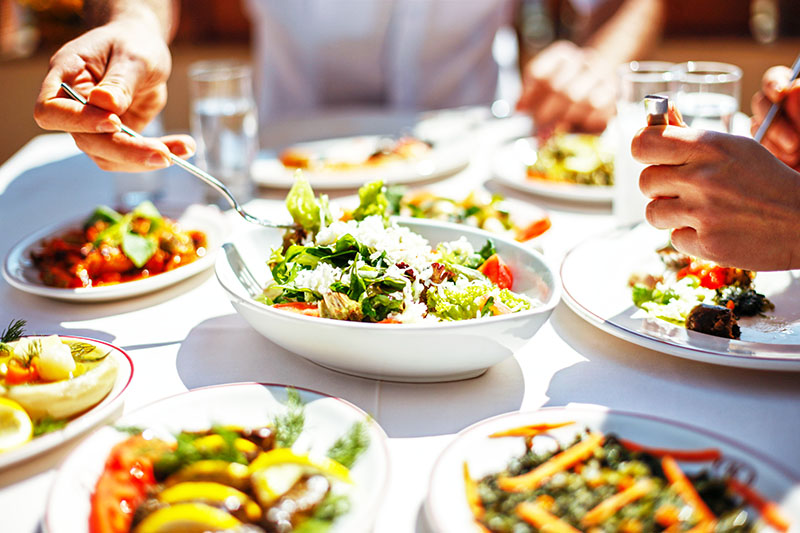A Greek-Cypriot mother’s kitchen is as skilfully run like a well-oiled machine. This is a world where food is ever-present; one’s self-regulation of hunger is lost, and sometimes never relearned. Gargantuan portions are pushed onto one’s plate; variety in a meal is a Greek-Cypriot mother’s societal or cultural instinct and she serves numerous options. We are conditioned from childhood onwards to yearn for the overflowing glass and the laden table. Like Alice in Wonderland, we become controlled by cakes that say, ‘Eat me,’ and bottles that say, ‘Drink me.’
Since food is love, when my mother instructs us to eat, and we do not, she acts like she has been rejected – not her Sunday roast. The parenting cliché that is used to cajole her children into eating applies: ‘There are starving people in Africa. You should be grateful that you have this food to eat.’ I have never understood the logic that leads people to believe that mentioning such tragic information could motivate anyone to eat, let alone develop a sudden appreciation for slaughtered lamb.
Nonetheless, Sunday arrives, and the family gather again to endure my mother’s weekly feast-fest and her side-serving of guilt. For the most part, healthy young children eat when they are hungry and stop when they are full. They are following their natural internal cues and one should not mess around with that by encouraging them to eat past their fullness. Offering a sweet reward is my mother’s technique that taught us, and now her grandchildren, that overconsumption leads to dessert – something to be valued over other foods. Observing my son wolfing down my mother’s palatable delights without restraint or thought is a sign that her food-from-the-heart is an accomplishment of her sole aim and purpose: to please her family.
All the hours slaving over a hot stove, slow-roasting and basting the finest cut of lamb, green olives with extra virgin olive oil, and grilled halloumi cheese seasoned with salt and pepper, kneading and baking her own aromatic, crusty bread, assembling a handful of ingredients that bring a thick and creamy yoghurt dip to life, stuffing and rolling vine leaves into bite-sized appetisers, rolling sheets of filo into custard-filled pastries drenched with a fragrant syrup made from lemon juice and orange blossom water, and brewing finely ground unfiltered coffee, are well worth the effort.
The average stomach can handle between one and one-and-a-half litres of food before getting the urge to throw it back up. The Greek-Cypriot stomach, however, can stretch to accommodate four times that much before breaking point. I observed the Sunday eating senselessness for many years, often convincing myself to reverse the damage at the start of the upcoming week. In a very real sense, eating like there is no tomorrow, may result in there being no tomorrow.
Beyond their controlling habits and side-servings of guilt, Greek-Cypriot mothers also have a special way of showing their love when it comes to their sons, holding an inordinate emotional control over them and having difficulty letting go. Greek-Cypriot men are so attached to their mothers that they rarely realise how harmful this attachment can be to their relationships with other women. These men consider their mother’s opinion for every important decision they make, many of them informing their mothers of every detail in their daily lives. From a young age, sons are warned that no other woman will love them as much, and there are many artful minxes lying in wait to entrap and marry them. If her son happens to fall in love with a non-Greek-Cypriot, she practically calls in the priest for an exorcism. If necessary, she will cite the bible – chapter and verse – to support her argument that Greek-Cypriots are not supposed to intermarry. “The bible teaches that one should not be unequally yoked.” 2 Corinthians 6:14.
As the Sunday feast ends, the male members of our unit typically adjourn to my mother’s living room – pants purposefully-unzipped due to excessive eating – for a generous sized helping of her mouth-watering dessert, engaging in meaningless small talk about football, politics and the opposite sex. The women observe the classic tenet of service etiquette: clearing the plates between servings, dishing out compliments to the matriarch for her God-given cooking talent, and leading a debate about men’s habits that are turnoffs for women, often speaking loudly to be heard effectively in the other room.
My mother, on the other hand, considers this the appropriate time to garner support in her campaign against her ‘better’ half. After five decades of marriage, the issue of leaving the toilet seat up has not yet been resolved, his alcohol-guzzling habits affect his concentration and memory, lack of appreciation, her sleep-deprivation due to his loud snoring, and “chatting and cuddling are just as important as what happens before sex – or even the act itself.”
Accepting imperfection is the place where great families begin. A simple nod from my father confirms my mother’s status as the “best cook in town,” and suddenly, the world in our little sphere is a better place again. The uneaten, edible remains of my Greek-Cypriot mother’s lavish blow-out are distributed equally into giant-sized packs-to-go, and her side-serving of guilt is put on hold temporarily, until next Sunday when our Greek-Cypriot family gathers again, and once more our world spins out of control.







Click here to change your cookie preferences